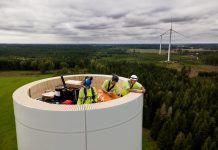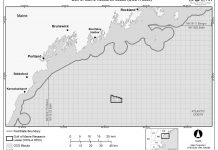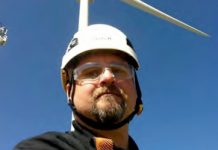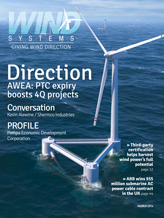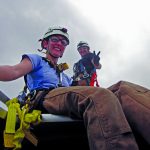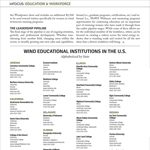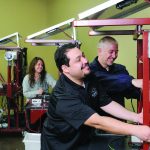What’s up with these wind energy technology schools who keep calling you asking about job openings for their graduates? It may seem like they are popping up all over the place. Before you dismiss them, consider the following: Some very motivated, intelligent, and dedicated professionals are filling a valuable niche in our industry by creating and developing these wind technician programs.
Some of these academies, Ecotech Institute, for example, among others, are driving technician education to new levels—beyond the traditional curriculum. As wind energy technology keeps expanding, the skill sets required of wind techs are broadening. At Ecotech, the curriculum goes beyond filter changing and wrench turning, into more advanced material like frequency converters, tribology, and full-scale troubleshooting.
Gone are the days of hiring anyone within earshot who can tell you the difference between a crescent wrench and a spanner. These early pioneers helped develop the O&M techniques many of us rely on today. Let’s honor their efforts at building that foundation, while celebrating a new era of more reliable talent acquisition. While many of yesterday’s technicians rose to become today’s operations VPs, many more left the industry due to injury, frustration, lack of appropriate skills and training, and even due to pessimism of the long term economic viability of our industry.
Most of us probably know former technicians who regret leaving wind without putting more effort into their own career development. If only there were experts available to help guide them towards being better technicians. Today, we have a small army of such experts who want to see wind energy continue to improve in terms of safety, reliability, cost competitiveness, and public relations. We call them “instructors.” And only true experts in our field should be considered viable for these instructor positions. Finding such talent with the combination of extensive field experience and teaching ability is not an easy task for most schools.
Ecotech Institute leverages its world-class facilities and higher starting salaries to attract world-class instructors. These instructors, in turn, continue to push our program to greater heights. We don’t see other wind energy technology programs as being our direct competition. A prospective student will choose a school based on any number of criteria (location, tuition, reputation, job placement success rate, etc.). What Ecotech hears time and time again is that our new students have encountered Ecotech graduates who are rising quickly in the field. Graduates from advanced training academies often have a significant advantage over the rest of the entry-level wind energy job seekers. I’ve had hiring managers tell me they have trouble finding job applicants that can compete with Ecotech Institute graduates.
Contrary to popular belief amongst would-be technicians, the purpose of a technical school is not to help students get their foot in the door. One month of training can teach someone to climb safely and turn a wrench. We don’t feel that a single job offer is the mark of success for our students. A solid wind energy program should train commissioner-level technicians who are prepared for their next two to three positions ABOVE entry-level. This cannot be accomplished in anything less than a full two-year program.
The bottom line is this: Better technicians work safer, more efficiently, and with better results. Ultimately, this means that we can continue to drive down the operating costs of America’s wind turbines. On some sites, the LCOE (levelized cost of energy) is competitive with coal and natural gas. This did not happen by accident. It came about as a result of the benefits of an economy of scale and improving best practices in O&M. As this trend continues, we will enjoy continued investment in wind energy, more turbines, and more jobs for hard-working Americans. Ecotech Institute is proud to be the first choice of hiring managers to fill these positions.




